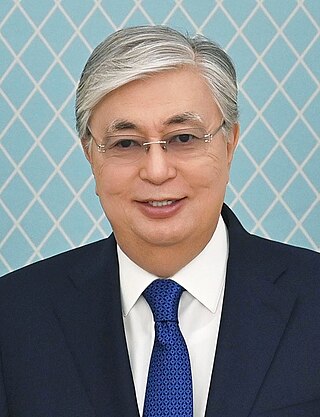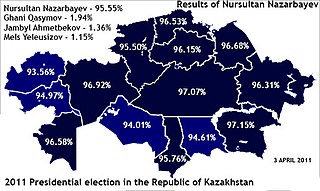Contents
| |||||
| Decades: | |||||
|---|---|---|---|---|---|
| See also: | |||||
Events in the year 1999 in Kazakhstan. [1]
| |||||
| Decades: | |||||
|---|---|---|---|---|---|
| See also: | |||||
Events in the year 1999 in Kazakhstan. [1]

The politics of Kazakhstan takes place in the framework of a presidential republic, whereby the President of Kazakhstan is head of state and nominates the head of government. Executive power is exercised by the government. Legislative power is vested in both the government and the two chambers of parliament.

Nursultan Abishulych Nazarbayev is a Kazakh politician and military officer who served as the first President of Kazakhstan, in autocratic rule from the country’s independence in 1991 until his formal resignation in 2019, and as the Chairman of the Security Council of Kazakhstan from 1991 to 2022.

The tenge is the currency of Kazakhstan. It is divided into 100 tiyn.

Kassym-Jomart Kemeluly Tokayev is a Kazakh politician and diplomat who is currently serving as the president of Kazakhstan since 20 March 2019. Between 20 March and 12 June 2019, he served as acting president after the resignation of Nursultan Nazarbayev, who previously held the presidential post for nearly three decades.

The Parliament of the Republic of Kazakhstan is the bicameral legislature of Kazakhstan. The lower house is the Mäjilis, with 98 seats which are elected to five-year terms. The upper house is the Senate, which has 50 members.

Elections in Kazakhstan are held on a national level to elect a President and the Parliament, which is divided into two bodies, the Majilis and the Senate. Local elections for maslihats are held every five years.

The president of the Republic of Kazakhstan is the head of state of the Republic of Kazakhstan and the commander-in-chief of the Armed Forces of the Republic of Kazakhstan. The president is the holder of the highest office within the Republic of Kazakhstan. The powers of this position are described in a special section of the Constitution of Kazakhstan.

Presidential elections were held in Kazakhstan on 4 December 2005. Incumbent president Nursultan Nazarbayev, in power since 1989, sought and won a 3rd term against four other candidates. Opposition candidates were allowed some access to the mass media, but this was still restricted. According to western election observers, opposition candidates also suffered considerable harassment. The Organization for Security and Co-operation in Europe (OSCE) criticized the elections, calling them unfair, but noted improvements.

Zharmakhan Aitbaiuly Tuyakbay is a retired Kazakh politician. He was the chairman of the Nationwide Social Democratic Party from 2007 to 2019 and prior to that, he served as the Mäjilis chairman from 1999 to 2004.

Amanat, previously known as Nur Otan until 2022, is a political party in Kazakhstan. Being the largest to date, it has been the ruling party of the country from 1999, with a membership claiming to be of over 762,000 people in 2007. Amanat has been led by Erlan Qoşanov since 26 April 2022.

Presidential elections were held in Kazakhstan on 10 January 1999. Incumbent president Nursultan Nazarbayev won the election with over 80% of the vote, and was sworn into office on 20 January 1999. Most observers viewed the election as blatantly unfair, further confirming that Nazarbayev was not interested in promoting a democratic system of government. Voter turnout was reported to be 87%.

Early presidential elections were held in Kazakhstan on 3 April 2011, having been originally scheduled for 2012. The elections were called after a plan for holding a referendum to increase president term limits to 2020 was rejected by the Constitutional Council. Nazarbayev was re-elected for a fourth term with 95% of the vote and a 90% turnout, against three nominal candidates. The Organization for Security and Co-operation in Europe (OSCE) has complained about a lack of transparency and competition in the vote.

Legislative elections were held in Kazakhstan on 15 January 2012. The result was a victory for the Nur Otan party, which won 83 of the 98 seats in the Mazhilis. However, the Organization for Security and Co-operation in Europe (OSCE) stated that the election "did not meet fundamental principles of democratic elections." The elections marked the first time that the second-placed party would gain parliamentary seats irrespective of whether it cleared the 7% electoral threshold. Due to the Zhanaozen massacre and the resulting state of emergency there, the election was not planned to be held in Zhanaozen. However, this decision was overturned on 10 January 2012.

Snap presidential elections were held in Kazakhstan on 26 April 2015 to elect the President of Kazakhstan. This was the fifth presidential election held and second without having any formal opposition candidates. With the highest-ever nationwide turnout of 95.2%, the result was a victory for long-term incumbent President Nursultan Nazarbayev of Nur Otan who received 97.8% of the vote, the largest since 1991, thus winning a fifth term in office while his closest challenger, Turgyn Syzdyqov, received only 1.6% of the votes.

Legislative elections were held in Kazakhstan on 20 March 2016. The date was set by president Nursultan Nazarbayev on 20 January 2016, when he dissolved the Mazhilis after it had requested dissolution on 13 January, with the reason cited being the economic crisis caused by low oil prices. Normally, the term of the Mazhilis would have expired in fall of 2016.

The inauguration of the president of Kazakhstan is a ceremony that takes place to mark the start of a new term for the president of the Republic of Kazakhstan.
Events of 2019 in Kazakhstan.

Snap presidential elections were held in Kazakhstan on 9 June 2019 to elect the President of Kazakhstan following the resignation of long-term President Nursultan Nazarbayev in March 2019. This was the sixth presidential election held since Kazakhstan's independence. The elections were not free and fair, and were widely denounced as a sham. Acting president Kassym-Jomart Tokayev of Nur Otan won the election.

Mels Hamzauly Eleusizov is a Kazakh political activist and ecologist who is the Chairman of Tabigat Ecological Union. He campaigned in many of Kazakhstan's elections, mostly notably in the 2005 and 2011 presidential elections.